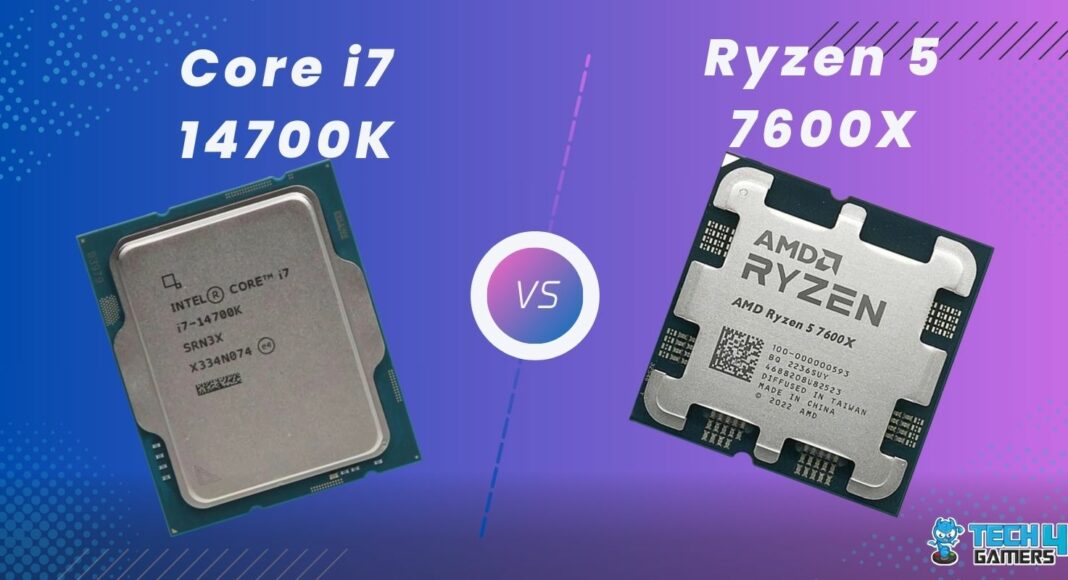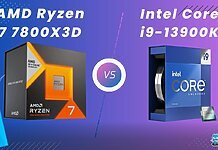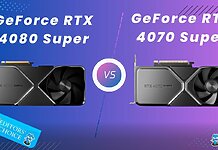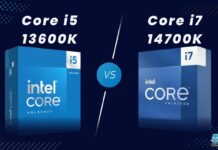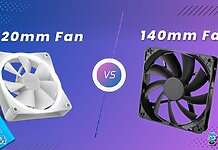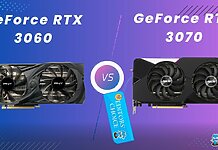Intel Core i7 14700K
Rated: 7/10
AMD Ryzen 5 7600X
Rated: 8/10
Pros & Cons
| CPU | Pros | Cons |
|---|---|---|
| Ryzen 5 7600X | ✅Better power efficiency ✅Relatively low price | ❌Significantly lower performance ❌Higher platform cost |
| Core i7 14700K | ✅Lower platform cost ✅Better performance | ❌Very old manufacuring process ❌High power draw |
Key Takeaways
- Our tests showed the Core i7 14700K to be around 15% faster than the Ryzen 5 7600X in gaming at 1080p. It also leads in productivity with, on average, 60.5% higher benchmark scores.
- The Intel processor was also 30% more power-hungry than the AMD chip, making it significantly less power-efficient.
- The Ryzen 5 7600X is around 60% cheaper than the Core i7, putting it in a different price bracket.
- The Ryzen 5 7600X has a better value proposition, so we recommend that most people choose this processor over the Core i7 14700K.
Specification Table
| Feature | Intel Core i7-14700K | AMD Ryzen 5 7600X |
|---|---|---|
| Processor Base Power | 125 W | 105W |
| Memory Types | Up to DDR5 5600 MT/s Up to DDR4 3200 MT/s | Up to DDR5 5200MT/s |
| Max Memory Size | 192 GB | 128 GB |
| Max Memory Bandwidth | 89.6 GB/s | N/A |
| Max # of Memory Channels | 2 | 2 |
| Processor Graphics | Intel UHD Graphics 770 | AMD Radeon Graphics |
| Graphics Base Frequency | 300 MHz | 400MHz |
| Launch Date | Q4’23 | Q3'22 |
| Best RAM | Best RAM For i7-14700K | Best RAM For Ryzen 5 7600X |
| Best CPU Coolers | Best CPU Coolers For i7-14700K | Best CPU Coolers For Ryzen 5 7600x |
| Best Motherboards | Best Motherboards For i7-14700K | Best Motherboards For Ryzen 5 7600X |
Architectural Differences
- Core Count: Starting off, the Core i7 demolishes the Ryzen 5’s core count, offering 28 threads using 8 performance cores and 12 efficiency cores, while the Ryzen 5 7600X uses 6 cores, totaling 12 threads.
- Clock Speed: The Ryzen 5 has a base frequency of 4.7GHz, with a boost of up to 5.3GHz, while the Core i7 14700K has an efficiency core base of 2.5GHz, a performance core base of 3.4GHz, an efficiency core boost of 4.3GHz and a performance core boost clock of 5.6GHz.
- Process Node: The Core i7 14700K uses outdated 10nm processing nodes, whereas AMD has made some strides in gaining better efficiency by using more complex 5nm process nodes.
- TDP: The PL2 TDP on the Core i7 14700K is around 253 watts, a monumental amount higher than the 142 watts for which the Ryzen5 7600X is rated.
- Memory: The Core i7 wins in terms of memory, supporting both DDR5 and DDR4 kits, while the Ryzen 5 7600X can only use more expensive DDR5 memory.
Things are heating up in the midrange market segment of the CPU market, which is leading customers to wonder whether upper-midrange processors are noticeably better than the lower end of the segment. Keep reading the Core i7 14700K vs Ryzen 5 7600X to get an answer to your curiosities.
Gaming Benchmarks – 1080p
Now that we have some technical groundings to judge both of these processors, this part of the Core i7 14700K vs Ryzen 5 7600X comparison will evaluate the performance of these chips in real-world gaming scenarios. To accomplish this, we used a test bench, the specifications of which are listed below:
Test Bench
- OS – Windows 11
- Mobo – Gigabyte X670E Master/MSI MAG Z790 Tomohawk DDR5
- RAM – XPG Lancer RGB 32GB 7200MT/s DDR5
- SSD – XPG GAMMIX S70 BLADE 2TB NVMe
- PSU – ENERMAX REVOLUTION D.F. X 1050W
- CPU Cooler – Arctic Liquid Freezer II 420 – AIO Water Cooler
- GPU – Asus ROG Strix RTX 4090 OC Edition
Baldur’s Gate 3

- Our testing started with a massive 30% lead for the Intel processor in Baldur’s Gate 3, with an average framerate of 153 FPS, significantly faster than the 117 FPS average that the Ryzen 5 7600X had.
- The 1% lows went from 99 FPS on the 7600X to around 127 FPS on the i7 14700K. There was a massive difference in smoothness between the two setups.
Hogwarts Legacy

- With all the knobs and dials turned up, the Core i7 14700K managed an average framerate of 75 FPS in Hogwarts Legacy, there’s the Ryzen 5 7600X had an average of only 64 FPS. This equates to an advantage of around 15% for the Intel processor.
- The 1% lows were even further apart, with the Ryzen hovering around 38 FPS, while the Core i7 stuck closer to a minimum of 49 FPS.
Starfield

- The 14700K gave an average framerate of around 102 FPS in Starfield, while the Ryzen 5 7600X touched the 80 FPS mark. This meant that the Core i7 lunged 27% ahead of its AMD rival.
- The 1% lows were around 83 FPS on the Intel processor, while the AMD’s efforts stuck around to 70 FPS.
Cyberpunk 2077

- The Ryzen held an average framerate of around 139 FPS in CD Project Red’s magnum opus, whereas the Core i7 had an average framerate of 166 FPS, 20% smoother than what we saw with the AMD processor.
- Our test of Cyberpunk also revealed that the Ryzen 5 7600X had lows of around 111 FPS, significantly lower than the Core i7’s minimum of around 141 FPS.
The Last Of Us Part 1

- This title ran with an average framerate of 164 FPS on the Ryzen 5 7600X, while the Core i7 14700K managed a framerate of closer to 181 FPS. This computes to an advantage of around 10% for the i7.
- The minimum framerates held around 139 FPS on the Ryzen processor, while the Core i7 had lows of 17 FPS.
Star Wars Jedi Survivor

- Averages on the Core i7 14700K were around 158 FPS in our test of the Star Wars game, while the Ryzen was 26% slower with an average framerate closer to 125 FPS.
- The 1% lows were around 102 FPS on the Ryzen 5 7600X, while the 14700K managed a much higher minimum of around 146 FPS.
Spider-Man Remastered

- In this more optimized title, our Core i7 had an average framerate of closer to 149 FPS, which was only 7% higher than the 139 FPS of the Ryzen 5 7600X, which leads us to believe there is still hope for AMD.
- The 1% lows were even closer, with the i7 going down to a framerate of around 126 FPS while the Ryzen 5 went down to around 122 FPS as its minimum framerate.
A Plague Tale Requiem

- The Core i7 14700K averaged a framerate of around 148 FPS in this title, whereas the Ryzen 5 7600X was only a hair behind with an average of 146 FPS.
- The 1% lows were also very close between the two chips, with the Ryzen hovering around 126 FPS at its minimums, while the Intel processor had lows closer to 130 FPS.
Assassin’s Creed Mirage

- The 7600X had an average framerate of 182 FPS in AC Mirage, while the Core i7 had an average framerate closer to 196 FPS, accumulating a difference of around 8% between the two.
- The 1% lows were around 163 FPS on the Intel processor, which was noticeably higher than the 156 FPS minimums that the Ryzen 5 7600X supplied.
Watch Dogs Legion

- The average framerate of the Core i7 14700K fell around 166 FPS in this Ubisoft title, while our tests saw the Ryzen 5 7600X giving an average framerate of around 151 FPS, which was around 10% lower than the Intel processor.
- The 1% lows came out to be around 120 FPS on the 14700K, while the lower tier Ryzen could only manage lows of around 110 FPS.
Hitman 3

- Finally, the last game of our testing had an average framerate of 276 FPS on the Core i7, while the Ryzen had an average framerate of only 234 FPS, which was a loss of around 17% for the Ryzen processor.
- 1% lows of the Core i7 14700K stayed above the average framerate of the Ryzen at around 247 FPS, while the 7600X had lows closer to 203 FPS. Once again, the difference in smoothness between the two chips was very noticeable.
Productivity Benchmarks
Now, let’s look at the fresh addition to our benchmark suite. These additional benchmarks were carried out with the same setup utilized for the gaming benchmarks, allowing uniformity throughout all testing.
Cinebench R23

- The single-threaded Cinebench test was passed by the Intel Core i7 14700K with 2070 points, which stood out over 7600X that earned 1953, by approximately 5.9%.
- The 14700K achieved 34891 points during the multi-core test, which was 129.3% higher than the Ryzen’s 15213 points.
7-Zip

- In the 7-Zip 32-megabyte dictionary compression test, the Core i7 14700K scored 147, and the Ryzen 5 7600X earned 77 points, giving the Intel CPU a significant 90.5% advantage.
- Similarly, the decompression results indicated the same picture. The Core i7 14700K got 2194 points, considerably outperforming Ryzen’s 1178 points by showing an 86.2% lead.
GeekBench v6

Overall Gaming Performance
| Processor | Core i7 14700K | Ryzen 5 7600X |
|---|---|---|
| Average FPS | 📈 161 | 📈 140 |
| 1% Lows | 📉 136 | 📉 116 |
| Productivity (Rating) | ✏️9/10 | ✏️7/10 |
| Winner: Core i7 14700K | ||
Average Framerate
Throughout our testing, we saw a 15% uplift in performance going from the Core i7 14700K to the Ryzen 5 7600X. The Intel processor had an overall average framerate of around 161 FPS, while the Ryzen 5 7600X had an average of 140 FPS.
This difference was very noticeable, especially in harder-to-run games like Hogwarts Legacy. While it is true that these metrics would become less significant as we went into higher-resolution gaming, a difference this big is huge when purchasing a processor.
Here are some glimpse of the tests we conducted for this comparison:
1% Lows
The 1% lows saw an even bigger 17.5% difference between the two chips, with the i7 averaging minimums of 136 FPS while the 7600X had lows of 116 FPS. This difference will exaggerate itself the further we go into the life cycle of these processors, especially as games start sharing the load between your CPU and GPU more heavily. This can lead to some serious stuttering disadvantages for the Ryzen 5 7600X.
The performance of the Core i7 14700K was undeniably better than its Ryzen rival, but there is more that goes into what makes a processor good, which we will be discussing below.
Productivity
In terms of overall productivity, the Core i7 showed outstanding performance compared to the Ryzen 5 7600X, gaining a massive lead in almost all the benchmark tests. We measured that Intel 14700k was, on average, 60.52% higher in productivity, while Ryzen kept lagging behind.
Power Consumption
As mentioned previously, Intel processors have been very competitive in performance for the past few years, but they have done little to improve power efficiency.
| Game | Core i7 14700K (W) | Ryzen 5 7600X (W) |
|---|---|---|
| Baldur's Gate 3 | 505 | 369 |
| Hogwarts Legacy | 448 | 344 |
| Starfield | 571 | 410 |
| Cyberpunk 2077 | 597 | 456 |
| Last Of Us Part 1 | 645 | 502 |
| Star Wars Jedi Survivor | 534 | 393 |
| Spider-Man Remastered | 473 | 354 |
| A Plague Tale Requiem | 545 | 491 |
| Assassin's Creed Valhalla | 489 | 389 |
| Watch Dogs Legion | 525 | 411 |
| Hitman 3 | 588 | 433 |
| Average Power Consumption | 538 | 414 |
| Winner: AMD's Ryzen 5 7600X | ||
Our tests confirm this, with the Core i7 drawing around 30% more power than the Ryzen 5 7600X. This, coupled with its 15% better performance, makes it around 10% less power efficient than its competitor. The higher power consumption can also rack up higher power bills, adding to the cost of ownership of the Core i7 14700K.
Price And Value
| CPU | Ryzen 5 7600X | Core i7 14700K | Price Difference |
|---|---|---|---|
| Launch MSRP | 💲299 | 💲409 | 37% |
| Current Price | 💲249 | 💲400 | 60% |
The MSRP of the Core i7 14700K is around $409, while the 7600X was launched with an MSRP of $299. The price of the i7 dropped to around $400 shortly after it was released, whereas the Ryzen 5 7600X dropped to around $249.
The i7 costs around 60% more than the Ryzen 5 7600X, putting it in a different price league. Thus, both processors target different sets of consumers.
Even though the Core i7 14700K performs better in my testing, considering the price difference between both processors, the Core i7 14700K is hard to recommend when I look at value for money because DDR5 memory modules are now much cheaper, reducing the overall AM5 platform cost, making Ryzen 5 7600X better choice for gaming coupled with lower power consumption and significantly lower operating temperatures.
– Ali
What We Recommend
Core i7 14700K: The productivity performance leads of this processor over its AMD rival are no joke. There might be better options than this processor in the broader market, but to keep within the scope of this comparison, one should get the Core i7 14700K if you want something with better performance, though only if the budget is not a problem for you.
Ryzen 5 7600X: If you need a budget processor coupled with an extended support platform until 2025, the Ryzen 5 7600X is a better option; that’s why value-conscious gamers might find the 7600X more compelling. However, if your focus is on productivity, the 7600X may not be the best option.
Ultimately, the best choice depends on your individual needs and budget. For gamers seeking a balance of performance, affordability, and future-proofing, the Ryzen 5 7600X emerges as a strong contender especially if productivity is not their main concern.
Frequently Asked Questions
Yes, the Core i7 14700K uses the same LGA 1700 socket that has been in use since the 12th-gen processors, so upgrading is as easy as taking the old one out and slotting the new one in.
The AM5 socket will not be out of fashion soon if AMD’s track record is anything to go by.
The iGPU on the Ryzen 5 7600X is clocked substantially higher than that on the Intel processor, but neither of them is good for anything but very light gaming sessions on modern titles.
More From Intel Core i7 14700K
More From AMD Ryzen 5 7600X
Thank you! Please share your positive feedback. 🔋
How could we improve this post? Please Help us. 😔
[Hardware Reviewer]
Hi! I’m Ali Tauseef, and I have been writing for Tech4Gamers since 2022. I love all things computer hardware but am particularly fond of CPUs and motherboards, and I like to stay up-to-date about the latest advancements in these worlds, and when possible, write about it. When I’m not doing that, I like to get into a little FPS action in CS2 or get lost in the vast world of RDR2.
Get In Touch: ali@tech4gamers.com


